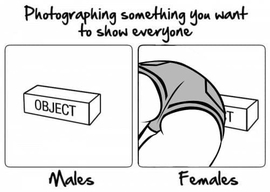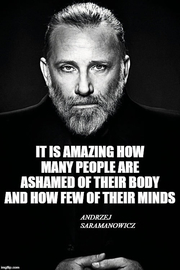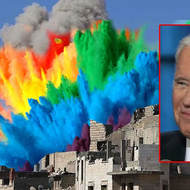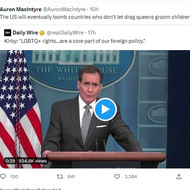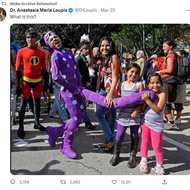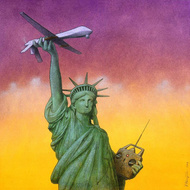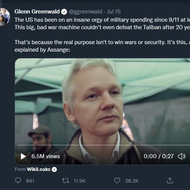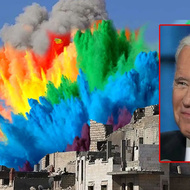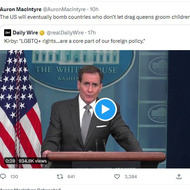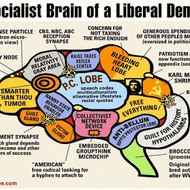"selfy shell macht Sie frei"
Influencer Poses For Thirst Traps In Front Of Concentration Camp & I Have Lost Faith In Humanity
...........................
When I first saw this years ago, I realized that the only way this could lead to is a repeat in history. I was just not sure who will be the jailer and who will be the prisoner.


Be part of the movement!
Welcome to the community for those who value free speech, evidence and civil discourse.Create your free account
2 comments
Feel free to reply to any comment by clicking the "Reply" button.So is this crass behavior (making sexy poses at Auschwitz) worse, the same or better than same sex "Marriages" and same sex "Weddings".
Would people who are expressing disgust and outrage over this tart posing at Auschwitz have the same feelings about two men being married in a holy or "sacred" place and officiated by an "ordained" priest or minister? Or what if the officiate of the same sex marriage is a Judge or a Magistrate.
Would folks who on one hand openly express support and approval of "gay marriage" be hypocritical if they are opposed on "moral grounds" over the posing of a "sex pot" on the tracks at Auschwitz?
So I ask rhetorically (of course) if Auschwitz is universally understood to be a place that calls for deep reverence and solemn respect then why do they not feel the same about the sanctity of true Marriage. That is Marriage of a Man and a Woman - a Bride and a Groom. Is not a Church or a Courtroom a place where people are expected to show deep respect for the Blessed Sacrament of Marriage itself?
Mind you I am NOT downplaying the significance of sites like Auschwitz or Trablinka or even The National Cemetery for that matter. I am merely pointing out a glaring inconsistency in how people think about things like Auschwitz compared with the sacrament of Holy Matrimony.
Think about it - is homosexual sex not an affront to the union of one man and one woman whose purpose as a wedded couple is to bring forth new human life born out of profound and intimate love for one another? Does common "buggery" and fellatio not constitute a mockery of the marital act of love making?
I think it does.
I think it is cowardly and phony nonsense that many if not most people tacitly and explicitly support homosexuality in general and homosexual "weddings" in particular. That kind of moral thought seems to be at odds with the reverence people feel and express about the Nazi Death Camps.
" I am merely pointing out a glaring inconsistency in how people think about things like Auschwitz compared with the sacrament of Holy Matrimony."
I notice the point and I acknowledge it. I think one of the reasons for it, is lack of political activism that Jews have applied to western nations, and Christians have not. Let's face it, Anti Christian sentiments were promoted by Pope Francis and many members of clergy and most self proclaimed Christians were not vigilante enough about protecting their own religion. Would it be the same during Crusades? Would Muslims, Marxists or anyone else burn down the Churches and mock Christian faith and get away with it?
Jews, and later Israeli goverment on the other hand took upon themselves to proactively go around the world and any promote the narrative of suffering by the Jews during holocaust and call anyone who questions their present political interest... anti Semite. Conveniently, deflecting criticism. While hypocritically treating people of Israel and Palestine in some strikingly similar ways as NAZI's did Jews during WWII.
That being said, the way NAZI's treated Russias/Soviets were even worse than most Jews were treated. I've seen interviews with both the Auschwitz guards, former Soviet POV's that survived and Jew prisoners that survived Auschwitz and they all agree. Soviet POVs' were treated deliberately even more harshly than Jews, and while 6 mill Jews or so died during WWII, Soviets, mostly Russians lost between 25-27 million, mostly civilians. Chinese were close to 20 mil. etc.
But Jews and their self appointed representatives manged to be better marketers of their suffering. Hence Auschwitz has a special status in the west. As historically important and symbolically important for many reasons, that camp is not unique when it comes to human suffering. It does not hold monopoly over human suffering and death. But because of its historic and symbolic reasons it manages to be used as symbol. Similar how in the west Hitler is seen as symbol of evil, while Stalin, Mao, Pol Pot etc are not. That is indoctrination for you.
But this is just one of many stories. Slavery for example in American liberal indoctrination is seen as only happening to Blacks whatever that means, and only in Atlantic Slave Trade. As if slavery did not exist in any other form and was not practiced by anyone else. Not to mention that Africans tribes hunted down other African tribes and sold it to slave traders. But much like symbolism of Hitler and Auschwitz liberals are very selective about history.
And given the change, they would apply Auschwitz methodology to white Americans if they could. And judging by the rhetoric and some of the recent developments in America, unless stopped , they will surly try to dip their toes in genocide. No doubt about that. All the ingredients are there. Its up to American people who oppose it to stop or at least try. So far, still many are not ready to understand or fight it outside of liberal paradigm.
"So is this crass behavior (making sexy poses at Auschwitz) worse, the same or better than same sex "Marriages" and same sex "Weddings"."
I guess it is a matter of proportion and concentration. Auschwitz in terms of people that were killed and in what manner there cannot be compared to same sex "Marriages" and same sex "Weddings". For obvious reasons of proportion and concentration and methods of suffering and killing caused by one vs the others.
That being said, I agree that gay path is comparable to NAZI path in terms of destruction. But until gays set up their own camps and start to commit genocide and start WWIII with 50-70 million dead, we can't really compare the two based on proportion and concentration and methods.
But I would say that in other format, abortion, grooming of children, sexual disises transmission, destruction of family units, destruction of culture etc. woke ideology is very destructive. And considering its been adopted by military industrial complex of America, its clear that it has no problems following in the footsteps of NAZI's which interestingly enough it supports when it suits it.
But unless Christians or whoever else is offended starts to fight back and promote their own values, don't expect everyone to agree with you.
As I've pointed out before and you stupidly laughed at it many times, maybe this time you will start paying attention about gay imperialism. Or you can play stupid like before and post another laughing emoji at me pointing out the dangers of what you find insulting yourself. Gay marriage and ideology.
The Grayzone: The Woke Imperium: the confluence between neoconservatism and social justice
Jul 12, 2022 Christopher Mott of the Institute for Peace and Diplomacy joins Max Blumenthal to discuss his provocative white paper on the Woke Imperium. According to Mott, "The rise of a ‘woke’ activist-driven, social justice-oriented politics—particularly among the members of academia, media, and the professional managerial class—has provided the latest ideological justification for interventionism, and it has become readily adopted by the U.S. foreign policy establishment."
By Christopher Mott
Key Findings
-
The advocates of American primacy within the United States foreign policy establishment historically rely on prevailing ideological trends of the time to justify interventionism abroad. The new ‘woke’ face of American hegemony and projects of empire is designed to project the U.S. as an international moral police rather than a conventional great power—and the result is neo-imperialism with a moral face.
-
This is an iterative and systemic process with an internal logic, not one controlled by a global cabal: when the older rationalizations for primacy, hegemony, and interventionism appear antiquated or are no longer persuasive, a new rationale that better reflects the ruling class norms of the era is adopted as a substitute. This is because the new schema is useful for the maintenance of the existing system of power.
-
The rise of a ‘woke’ activist-driven, social justice-oriented politics—particularly among the members of academia, media, and the professional managerial class—has provided the latest ideological justification for interventionism, and it has become readily adopted by the U.S. foreign policy establishment. These groups now have an even greater level of symbiotic relationship with state actors.
-
Professional selection and advancement under these conditions require elite signaling of loyalty to ‘progressive’ universalism as the trending state-sanctioned ideology, which further fuels the push towards interventionism. This combination of factors encourages a new institutional and elite consensus around trending shibboleths.
-
The emerging hegemonic posture and its moral imperialism are at odds with a sober and realistic appraisal of U.S. interests on the world stage, as they create untenable, maximalist, and utopian goals that clash with the concrete realities on which U.S. grand strategy must be based.
-
The liberal Atlanticist tendency to push moralism and social engineering globally has immense potential to create backlash in foreign, especially non-Western, societies that will come to identify the West as a whole with niche, late-modern progressive ideals—thus motivating new forms of anti-Westernism.
Executive Summary
The primacist, interventionist wing of the United States foreign policy establishment—’the Blob’—has a long history of using prevailing moralist trends to serve as ideological justifications for expansionist and hawkish policies. From Presidents William McKinley and Woodrow Wilson on through the militant democracy promotion of the George W. Bush administration, this process often mutated to accommodate the de jour proclivities and entrenched biases of the policy-making class. The newest iteration of this process is the adoption of social justice causes and rhetoric as the explicit goals of the United States’ foreign policy. Such use and weaponization of the language of justice to advance the foreign policy objectives of the liberal Atlanticist Blob is particularly evident against regions and countries the West believes actively challenge the Liberal International Order (LIO) status quo or where it seeks to justify military and economic interventions on normative grounds.
Rather than a coordinated conspiracy directed from a central organization or even a conscious desire on the part of the participants however, this process of adopting, incorporating, and cultivating new rationales to sustain what is an idealist and internationalist strategic culture in the United States has become routinized. This entrenchment of systemic moralism in the American national security apparatus has been facilitated, and is at least partly driven, by a highly competitive professional class vying to secure their position in the system by using virtue signaling to demonstrate class solidarity to their higher ranks. This mimetic mechanism incentivizes pushing the envelope and chasing trending causes (normative mimicry)—but always in service of the imperial needs of the state where expansionism and primacy are viewed as the triumph of a universalized American conception of virtue over those forces which are viewed as being on ‘the wrong side of history’. Under such moralistic conditions, prudence, moderation, and narrower conceptions of interest—provisos of realism—could be effectively vilified as enabling oppression and injustice.
The current Wokeist incarnation of American globalist evangelism seeks not only to change the governments of other nations, but engineer their very cultures according to the Western progressive model. Its universalist framing of human values could be readily applied to violate or undermine the sovereignty of alternate political or cultural systems and justify those interventions for the domestic Western audiences in the name of ‘moral responsibility’.
This white paper seeks to elucidate the often hidden processes and mechanisms that have led to the consolidation of this “woke imperium” of moralistic cosmopolitanism: its historical roots, present day trends, and possible future evolution. It is also intended as a guide for advocates of realism and restraint: to help realists understand the nature of the resistance they are likely to encounter from certain sectors of the foreign policy establishment and their sympathizers as they try to realign U.S. foreign policy goals with more limited and concrete national interests.
Dr. Christopher Mott (@chrisdmott) is a Research Fellow at the Institute for Peace & Diplomacy and a former researcher and desk officer at the U.S. Department of State.
Read his paper here: [peacediplomacy.org]
The US will eventually bomb countries who don’t let drag queens groom children
Daily Wire @realDailyWire
US White house admiral and Pentagon spokesperson John Kirby: "LGBTQ+ rights...are a core part of our foreign policy."
I do remember responding to you with a laughing emoji several times but the topic escapes my memory. What you typed here is quite dense and therefore difficult to absorb (I'm old and my brain aint what it used to be)...nevertheless I think I agree with the theme of what you wrote here.
@Krunoslav
But I would say that in other format, abortion, grooming of children, sexual disises transmission, destruction of family units, destruction of culture etc. woke ideology is very destructive
We agree on that!
I don't expect agreement with my remarks here. In fact I fully expected to get a lot of rationalized push back.
My position is not so much a defense of any religion as it was meant to be a defense of a perceived natural order of things (my own perception of course)
I fully recognize and acknowledge that others don't, and will not necessarily agree with my personal observations.
I guess the whole point of my comment was to point out a glaringly obvious inconsistency in the moral posturing of the masses regarding the deliberative attempt of Nazi Germany to wipe out Jews and Jewishness vs the seeming indifference (of the masses) toward the deliberative derisiveness and destruction of a cornerstone of society's Moral foundation - namely the human family. Of which requires male / female bonding.
I do appreciate your responses to my comments
@iThink I actually agree with you on that. I certainly think that only in society where liberalism exists there are conditions to get to where Anglo-sphere is right now. I think someone refereed to it as the guilt of the liberal, that can be exploited. Either way, just for reference. About 10 years ago, I don't think gay marriage was legal in most if not all countries.
Same-Sex Marriage Around the World
[pewresearch.org]
...and yet in less than a decade we have gotten to the point of drag queens and the most degenerate perverted individuals grooming children, deranged mothers sending their children to be butchered, and all sponsored, funded, promoted and in some cases mandate by the state and promoted as the new religion. If left unchallenged, its not hard to see it ending the same way NAZI's did their horrors.
So I'm there with you on that. Moral outrage is badly lacking and its the liberal pacification of people. Free speech, and rights doctrine and all that liberal garbage. Otherwise there would not even fertile ground on which this cancer can grow.
I've been posting a lot about the problems of liberalism and how what we see its not a bug but a feature of its ideology. And speaking of morality, that is another problem of liberalism. Lacking in morality. Especially coherent morality.
The liberal ideology is a contemporary religion. I disagree with the viewpoint of the progressive modern liberals that pursuing religious freedom is a worthwhile objective, because it is a false premise. Liberals impose their own religion upon other religions because they believe it to be the only true faith and the most moral of them all. So much so, they believe that simply self-identifying as a liberal is enough to be morally superior. They outsource the responsibility of personal morality by unloading it onto the liberal ideology itself. This is expanded by the Liberal dogma of the “doctrine of universal human rights.” Those who disagree with it are rarely tolerated; hence, those that are more dogmatic among the liberals, consider even challenging the human rights doctrine to be blasphemous.
“Thanks to TV and for the convenience of TV, you can only be one of two kinds of human beings, either a liberal or a conservative.”
― Kurt Vonnegut, Jr.
And conservative is defeated liberal, one who accepts many tenants of a liberal doctrine, but is pretending to be the opposition. But historically the track record of conversation has been terrible, it managed to conservative practically noting, only delay liberals and their derivatives marching towards utopia.
Just take Roe v Wad, killing at sole discretion on women, where liberal judges took upon themselves to answer the question supreme court was not designed to do. And yet instead of involving other points of view, it used the power of the supreme court to mandate to everyone a defeat, so that everyone from father to Christians and moral individuals cannot interfere in women's "right" to kill its own child as she chooses. Utter insanity. But once the cat is out of the bag, sort of speak...
“I would rather try to organize politics and political discourse in a way that encouraged engagement on moral and religious questions. …If we attempt to banish moral and religious discourse from politics and debates about law and rights, the danger is we’ll have a kind a vacant public square or a naked public square.
And the yearning for larger meanings in politics will find undesirable expression. Fundamentalists will rush in where liberals fear to tread. They will try to clothe the naked public square with the narrowest and most intolerant moralism.”
*Michael Joseph Sandel is an American political philosopher.
.............................
“The conservative "thinks of political policies as intended to preserve order, justice, and freedom. The ideologue, on the contrary, thinks of politics as a revolutionary instrument for transforming society and even transforming human nature. In his march toward Utopia, the ideologue is merciless.” ― Russell Kirk
“Kirk defined the ideologue as one who “thinks of politics as a revolutionary instrument for transforming society and even transforming human nature.” Unleashed during the most radical phase of the French Revolution, the spirit of ideology has metastasized over the past two centuries, wreaking horrors. Jacobinism, Anarchism, Marxism, Leninism, Fascism, Stalinism, Nazism, Maoism—all shared the fatal attraction to “political messianism”; all were “inverted religions.” Each of these ideologies preached a dogmatic approach to politics, economics, and culture. Each in its own way endeavored “to substitute secular goals and doctrines for religious goals and doctrines.” Thus did the ideologue promise “salvation in this world, hotly declaring that there exists no other realm of being.” ― Russell Kirk, The American Cause
“In American popular usage today, 'liberalism' means left-liberalism – not to be confused with 'neoliberalism' ... and is expressly contrasted with 'conservatism'. In this usage a liberal is one who leans consciously towards the underprivileged, supports the interests of minorities and socially excluded groups, believes in the use of state power to achieve social justice, and in all probability shares the egalitarian and secular values of the nineteenth century socialists.” ― Roger Scruton, Conservatism: An Invitation to the Great Tradition
“Liberalism has failed, not because it fell short, but because it was true to itself. It has failed because it has succeeded. As liberalism has become more fully itself, as its inner logic has become more evident and its self contradictions manifest, it has generated pathologies that are at once deformations of its claims, yet realizations of liberal ideology.
A political philosophy that was launched to foster greater equity, defend a pluralist tapestry of different cultures and beliefs, protect human dignity, and of course expand liberty in practice generates titanic inequality, enforces uniformity and homogeneity, fosters material and spiritual degradation, and undermines freedom.”
― Patrick Deneen, Why Liberalism Failed (2018)
Reminds me of what someone said. Liberalism delivered what it promised, but it was the opposite of what most expected.
Liberalism vs. Reality - Feb 29, 2020 Excerpt from James Burnham, Suicide of the West (1964; New York: Encounter Books, 2014), pp. 319-40; 345-9.
Feb 29, 2020 Excerpt from James Burnham, Suicide of the West (1964; New York: Encounter Books, 2014), pp. 319-40; 345-9.
The Guilt of the Liberal - Feb 29, 2020 Excerpt from James Burnham, Suicide of the West (1964; New York: Encounter Books, 2014), pp. 221-8.
@iThink Yes, you were condescendingly laughing at me for pointing out the imperial nature of American foreign policy under neoliberalism and neoconservatism—essentially globalist ideologies.
"Until relatively recently, the USA has not been a direct or explicit sort of imperial power, in the sense that Great Britain had been, but rather an “indirect” or “informal” empire, working more through tremendous cultural and economic influence than direct military intervention. As Anne McClintock comments in Imperial Leather,
Since the 1940s, the U.S.’ imperialism-without-colonies has taken a number of distinct forms (military, political, economic and cultural). Some concealed, some half-concealed. The power of U.S. finance capital and huge multinational corporations to command the flows of capital, research, consumer goods and media information around the world can exert a coercive power as great as any colonial gunboat."
Here is a pretty damning report on this.
As former U.S. President Jimmy Carter put it, the United States is undoubtedly the most warlike nation in the history of the world. According to a Tufts University report, "Introducing the Military Intervention Project: A new Dataset on U.S. Military Interventions, 1776-2019," the United States undertook nearly 400 military interventions globally between those years, 34 percent of which were in Latin America and the Caribbean, 23 percent in East Asia and the Pacific, 14 percent in the Middle East and North Africa, and 13 percent in Europe. Currently, its military intervention in the Middle East and North Africa and sub-Saharan Africa is on the rise.
As you can see... I was not just whistling dixie and talking out of my ass.
And now its woke imperialism as I have posted in my other reply. A match made just a few feet bellow heaven.
@Krunoslav
The liberal ideology is a contemporary religion
I believe the formal terminology for that is "Secular Humanism"
This is the basic message and philosophy that inform John Lennons big hit song "Imagine"
"...imagine there is no heaven, no hell below us; nothing to live or die for, above us, only sky..."
Although I was a youthful 20 something when that song hit the charts I had a viscerally negative reaction to it. I feel the same today as I did then about this song.
@iThink "I believe the formal terminology for that is "Secular Humanism""
I don't think so. Let me elaborate. You mentioned "Secular humanism". Lets examine that.
But long story short secular humanism is a movement, more than a religion. Just like Classical humanism existed along with Pagan religions and Christian Humanism existed with Christianity, Secular Humanism attempts to exist as part of liberalism.
To understand what you refereed to as "secular humanism", you have to understand; the Greco Roman classics, Christian theology, and liberal theology.
Lets talk about the terminology first.
Secularity, also the secular or secularness (from Latin saeculum, "worldly" or "of a generation" ), is the state of being unrelated or neutral in regards to religion. Anything that does not have an explicit reference to religion, either negatively or positively, may be considered secular.
Linguistically, a process by which anything becomes secular is named secularization, though the term is mainly reserved for the secularization of society; and any concept or ideology promoting the secular may be termed secularism, a term generally applied to the ideology dictating no religious influence on the public sphere.
Secularism is the principle of seeking to conduct human affairs based on secular, naturalistic considerations.
Secularism is most commonly defined as the separation of religion from civil affairs and the state, and may be broadened to a similar position seeking to remove or to minimize the role of religion in any public sphere. The term "secularism" has a broad range of meanings, and in the most schematic, may encapsulate any stance that promotes the secular in any given context.It may connote anti-clericalism, atheism, naturalism, non-sectarianism, neutrality on topics of religion, or the complete removal of religious symbols from public institutions.
As a philosophy and as a political stance, secularism seeks to interpret life based on principles derived solely from the material world, without recourse to religion. It shifts the focus from religion towards "temporal" and material concerns.
There are distinct traditions of secularism in the West, like the French, Turkish and Anglo-American models, and beyond, as in India, where the emphasis is more on equality before law and state neutrality rather than blanket separation
The Anglo-American model is interesting because it is used most widely in arguments. When settlers came to the new world. The Americas. They were mostly Christians, yes, but roughly divided into Catholics and Protestants. For Catholics, it was easy. There is a rigid hierarchy in the Catholic Church system and clear rules. However, protestants faced the challenge of living alongside Catholics and possibly other religious groups, including atheists, in addition to the many denominations among protestants. Hence, the founders of the United States decided to impose liberalism on everyone and pretend they were neutral in matters of religion, conveniently pretending they were neutral when it came to religion to avoid infighting. While most Americans were Christians, the idea of secularism was that each would pray in their own church, but Christianity would provide a stable common moral code.
Amendment I of the Constitution of the United States.
"Congress shall make no law respecting an establishment of religion, or prohibiting the free exercise thereof; or abridging the freedom of speech, or of the press; or the right of the people peaceably to assemble, and to petition the government for a redress of grievances."
First Amendment
The First Amendment guarantees freedoms concerning religion, expression, assembly, and the right to petition. It forbids Congress from both promoting one religion over others and also restricting an individual’s religious practices. It guarantees freedom of expression by prohibiting Congress from restricting the press or the rights of individuals to speak freely. It also guarantees the right of citizens to assemble peaceably and to petition their government.
The first clause in the Bill of Rights states that “Congress shall make no law respecting an establishment of religion.”
Establishment clause of First Amendment often interpreted to require separation of church and state
For approximately the first 150 years of the country’s existence, there was little debate over the meaning of this clause in the Constitution. As the citizenry became more diverse, however, challenges arose to existing laws and practices, and eventually, the Supreme Court was called upon to determine the meaning of the establishment clause.
Though not explicitly stated in the First Amendment, the clause is often interpreted to mean that the Constitution requires the separation of church and state.
'Separation of church and state' metaphor rooted in early American fears of government involvement
Roger Williams, founder of Rhode Island, was the first public official to use this metaphor. He opined that an authentic Christian church would be possible only if there was “a wall or hedge of separation” between the “wilderness of the world” and “the garden of the church.” Williams believed that any government involvement in the church would corrupt the church.
Roger Williams (1604?–1683) was born in London, England, and earned a degree from Pembroke College, Cambridge, in 1627. After studying theology, he worked briefly as a chaplain before embracing Puritanism.
As a separatist, Williams believed that the Church of England was beyond redemption, and he refused advancement within it. He emigrated to Boston in February 1631, and a few months later he became a teacher in the church at Salem. Roger Williams clashed with Puritan fathers on interlocking of church and state.
To contemporaries as well as to later observers, Williams appeared as a man out of place. Instead of accepting the authority of the Puritan fathers of the Massachusetts Bay Colony, Williams clashed with them. He questioned matters that no one else debated, at least not publicly.
Williams objected to the interlocking of church and state in an era when such a union was regarded as integral to the functioning of government. He alienated the Puritan clergy in Boston when he asserted that the civil magistrates were not authorized to enforce the “First Table,” or the first four of the Ten Commandments which pertain to the private spiritual life.
Williams put on trial for speaking his mind, banished from Massachusetts Bay Colony
Williams believed that the magistrates had no jurisdiction over the consciences and souls of people, and he further denied the validity of oaths when oaths were the most solemn of undertakings at that time. He also condemned prayer offered in company with those who were not sufficiently devout, but perhaps most seriously, Williams declared that the Crown had no right to take the lands of Native Americans without adequately compensating the Indians for the territory.
For speaking his mind, Williams was tried before the Massachusetts General Court in July 1635. When he refused to recant, he received a sentence of banishment from the colony with the threat of sending him back to England to prevent him from spreading his beliefs throughout the New World. The civil authorities of Massachusetts Bay and the ministers of the Massachusetts churches hoped that banishment would provide a final answer to the questions that Williams had raised. Aided by a friend, William escaped to Manton’s Neck within Plymouth Colony, however, and in June 1636, at the insistence of Plymouth authorities, Williams moved out of that territory.
Williams thought church and state should be separate to preserve integrity of the church and so Williams starts Providence colony that had complete religious freedom.
Unlike Thomas Jefferson who would follow, Williams did not wish to separate church and state primarily to preserve the peace and purity of the state but rather to preserve the peace and integrity of the church. He opposed linking political and economic privilege to church membership because such privileges corrupted the honesty of religious life. In essence, Williams adhered to a more Puritan form of Puritanism than the fathers of Massachusetts Bay.
Williams came to doubt Puritanism and became a Baptist in 1639, going on to establish the first Baptist church in America. Within a few years, however, Williams refused to follow any specific religion, although he still accepted the basic tenets of Christianity.
........................
@iThink The most famous use of the metaphor (Separation of Church and State) was by Thomas Jefferson in his 1802 letter to the Danbury Baptist Association. In it, Jefferson declared that when the American people adopted the establishment clause they built a “wall of separation between the church and state.”
“...legitimate powers of government reach actions only, & not opinions, I contemplate with sovereign reverence that act of the whole American people which declared that their legislature should 'make no law respecting an establishment of religion, or prohibiting the free exercise thereof,' thus building a wall of separation between Church & State. Adhering to this expression of the supreme will of the nation in behalf of the rights of conscience, I shall see with sincere satisfaction the progress of those sentiments which tend to restore to man all his natural rights, convinced he has no natural right in opposition to his social duties.”
― Thomas Jefferson, Letters of Thomas Jefferson
Jefferson had earlier witnessed the turmoil of the American colonists as they struggled to combine governance with religious expression. Some colonies experimented with religious freedom while others strongly supported an established church.
Jefferson fought to disestablish Anglican church in Virginia colony
One of the decisive battlegrounds for disestablishment was Jefferson’s colony of Virginia, where the Anglican Church had long been the established church.
Disestablishment (to take away a particular church's status as the official church of a nation or state)
Both Jefferson and fellow Virginian James Madison felt that state support for a particular religion or for any religion was improper. They argued that compelling citizens to support through taxation a faith they did not follow violated their natural right to religious liberty. The two were aided in their fight for disestablishment by the Baptists, Presbyterians, Quakers, and other “dissenting” faiths of Anglican Virginia.
During the debates surrounding both its writing and its ratification, many religious groups feared that the Constitution offered an insufficient guarantee of the civil and religious rights of citizens. To help win ratification, Madison proposed a bill of rights that would include religious liberty.
As presidents, though, both Jefferson and Madison could be accused of mixing religion and government. Madison issued proclamations of religious fasting and thanksgivings while Jefferson signed treaties that sent religious ministers to the Native Americans. And from its inception, the Supreme Court has opened each of its sessions with the cry “God save the United States and this honorable court.”
Public school religion cases allow Supreme Court to define establishment clause protection
It was not until after World War II that the Court interpreted the meaning of the establishment clause.
In Everson v. Board of Education (1947), the Court held that the establishment clause is one of the liberties protected by the due process clause of the Fourteenth Amendment, making it applicable to state laws and local ordinances. Since then the Court has attempted to discern the precise nature of the separation of church and state.
In 1971 the Court considered the constitutionality of a Pennsylvania statute that provided financial support to nonpublic schools for teacher salaries, textbooks, and instructional materials for secular subjects and a Rhode Island statute that provided direct supplemental salary payments to teachers in nonpublic elementary schools.
The Schempp family, brought suit that led to a 1963 ruling by the Supreme Court in Abington School District v. Schempp that banned bible reading and the recitation of The Lord's Prayer in public schools, saying that it violated the First Amendment's establishment clause requiring separation of church and state.
Lemon test developed to vet laws dealing with religious establishment
In Lemon v. Kurtzman (1971), the Court established a three-pronged test for laws dealing with religious establishment. To be constitutional a statute must have “a secular legislative purpose,” it must have principal effects that neither advance nor inhibit religion, and it must not foster “an excessive government entanglement with religion.”
Twenty-six years later the Court modified the Lemon test in Agostini v. Felton (1997) by combining the last two elements, leaving a “purpose” prong and a modified “effects” prong.
In County of Allegheny v. American Civil Liberties Union (1989), a group of justices led by Justice Anthony M. Kennedy in his dissent developed a coercion test: the government does not violate the establishment clause unless it provides direct aid to religion in a way that would tend to establish a state church or involve citizens in religion against their will.
Endorsement test used in cases involving religious displays on public property
Justice Sandra Day O’Connor proposed an endorsement test that asks whether a particular government action amounts to an endorsement of religion.
In Lynch v. Donnelly (1984), O’Connor noted that the establishment clause prohibits the government from making adherence to a religion relevant to a person’s standing in the political community. Her fundamental concern was whether government action conveyed a message to non-adherents that they are outsiders. The endorsement test is often invoked in religious display cases.
In McCreary County v. American Civil Liberties Union (2005), the Court ruled that the display of the Ten Commandments in two Kentucky courtrooms was unconstitutional but refused in the companion case, Van Orden v. Perry (2005), to require the removal of a long-standing monument to the Ten Commandments on the grounds of the Texas State Capitol.
Court says in neutrality test that government must treat religous groups the same
Questions involving appropriate use of government funds are increasingly subject to the neutrality test, which requires the government to treat religious groups the same as it would any other similarly situated group.
In a test of Ohio’s school voucher program, the Court held 5-4 in Zelman v. Simmons-Harris (2002) that Ohio’s program is part of the state’s general, neutral undertaking to provide educational opportunities to children and does not violate the establishment clause. In his opinion for the majority, Chief Justice William H. Rehnquist wrote that the “Ohio program is entirely neutral with respect to religion.”
From the colonial era to the present, religions and religious beliefs have played a significant role in the political life of the United States. Religion has been at the core of some of the best and worst movements in the country’s history. As religious diversity continues to grow, concerns about separation of church and state are likely to continue.
This article was originally published in 2009. J. Mark Alcorn is a high school and college history instructor in Minnesota. Hana M. Ryman is a Middle School Humanities Educator in Orlando, Florida.
P.S.
If it ends as communist state, than the communist party will take the roll or God, State, Party, and Church and religious freedom will not be allowed. As we have seen today with woke religion being adopted as official one.
“I would rather try to organize politics and political discourse in a way that encouraged engagement on moral and religious questions. …If we attempt to banish moral and religious discourse from politics and debates about law and rights, the danger is we’ll have a kind a vacant public square or a naked public square.
And the yearning for larger meanings in politics will find undesirable expression. Fundamentalists will rush in where liberals fear to tread. They will try to clothe the naked public square with the narrowest and most intolerant moralism.”
*Michael Joseph Sandel is an American political philosopher.
...............................
Liberalism as a theology gets things right when it comes to legal rights, private property, the rule of law, fair trials, etc. But it deliberately tries to "liberate" itself from assigning a shared moral code. It claims that no institution should impose morals on individuals. They must choose for themselves. Not that liberalism denies the existence of right and wrong, but rather that there are no previous moral ties to any moral norms of the past, and it is up to the individual to free himself from those moral ties and thus develop his own morality.
Unfortunately, because liberalism requires the power of the state to secure legal rights, it simultaneously says that an individual can exist on its own in theory. However, it recognizes that we cannot live without legal protection, so it grants the state the authority to enforce those rights. And so, it’s big on legal rights but weak on moral responsibilities. As we can see today, this inherently leads to it empowering either the right or left side of its enemies. Liberalism has been undermined by the very people who once represented it. Therefore, it empowers its own enemies for selfish reasons. It tries to avoid having a shared moral code, and no nation can survive without one.
Because liberalism arose as a reaction to the age of the monarchy and church, it is always skeptical and sometimes hostile toward them, but it fails to recognize its own contradictions. Because liberalism argues we are all reasonable individuals, and if only there was no religion to limit us, we would all be free and reach our potential. It is sometimes called the "cult of reason.’
This might be true for individuals here and there, but there is no evidence that this is true for society. But because men are not reasonable animals but rationalizing animals, we need a collectively shredded moral code, along with a liberal understanding of legal rights, to have a chance of preserving what we might consider liberty.
Classical liberals have kept them in good shape, riding the wave of shared moral codes they inherited from the long Judeo-Christian tradition. But if the liberal philosophy does not have a built-in way to preserve them, which it does not, it is only a matter of time before the old morals fade and new generations seek something else. More privileges and less responsibility. And so, the old classical liberals were replaced by new liberals.
“Modern liberalism suffers unresolved contradictions. It exalts individualism and freedom and, on its radical wing, condemns social orders as oppressive. But it expects government to provide materially for all, a feat manageable only by an expansion of authority and a swollen bureaucracy. Liberalism defines government as a tyrant father but demands it behaves as nurturant mother.
Liberalism, like second-wave feminism, seems to have become a new religion for those who profess contempt for religion. It has been reduced to an elitist set of rhetorical formulas, which posit the working class as passive, mindless victims desperately needing salvation by the state. Individual rights and free expression, which used to be liberal values, are being gradually subsumed to the worship of government power.
The problems on the American left were already manifest by the late 1960s, as college-educated liberals lost contact with the working class for whom they claimed to speak… For the past 25 years, liberalism has gradually sunk into a soft, soggy, white upper-middle-class style I often find preposterous and repellent.”
And this inevitably gave rise to the really intolerant, extreme leftist ideologies we see now. It was not a matter of whether it would happen, but when it would happen, and it is because liberalism, by its very nature, refused to engage in discussion of a shared moral code. Its integrity is jeopardized without it. Achilles heel.
And for many today, self-identifying as liberals has become a way to outsource moral responsibility to the liberal ideology itself. That is why many liberal intellectuals are so smug. They consider liberalism to be the most moral ideology, but refuse to define their shared moral code. And that is why I consider liberalism a religion. It considers itself to have the best moral ideology. To change one’s opinion and see liberalism as a flawed ideology would mean one must now find something else, and that is so scary for many liberals that they would rather defend the indefensible than say liberalism has a problem. And that is the characteristic of religions.
Classical liberalism holds that everyone should develop their own morals and that morals should not be derived from a single organization or person. It gives itself the liberty to do exactly that with "rights."
..................................................................
@iThink American Civil Religion
American civil religion is a term given to a shared set of certain fundamental beliefs, values, holidays, and rituals by those who live in the United States of America. These shared values and holidays are based upon, parallel to, but independent of the theological tenets of each specific denomination or religious belief. The notion of a civil religion originated in the United States due to its origins as a religiously diverse nation. From the Pilgrim founders and the other Puritan groups to the numerous other groups fleeing religious persecution, the American nation had a unique experience and developed a system that allowed for maximum freedom of religion for individuals and groups while allowing no one religious denomination to dominate. In this context, the nation developed a religious, primarily Protestant ethos and a set of values based on religion but not overtly based on any, one tradition.
The term was coined by sociologist Robert Bellah in 1967. The article in which the term is coined, “Civil Religion in America,” sparked one of the most controversial debates in United States sociology. Soon after the paper was published, the topic became the major focus at religious sociology conferences and numerous articles and books were written on the subject. The debate reached it peak with the American Bicentennial celebration in 1976.
The American civil religion emerged as a means to permit the creation of a distinct national set of values that was not tied to a specific confession. It permitted religion to play a fundamental role in shaping the moral vision of the country but in a way that removed theological concerns from the public arena.
But over enough generations and more liberal influence what has happened? The inevitable. That Civil Religion in America became weaker and was replaced by more and more liberal values and that inevitably let to more radical lefty values.
The United States was settled in part by religious dissenters from the established Church of England, who desired a civil society founded on a different religious vision. Consequently, there has never been a state church in the United States and individual state churches have not existed in the United States since the early nineteenth century. Religious denominations compete with one another for allegiance in the public square.
These facts have created a public discourse which accepts regular displays of religious piety by political leaders but in a vocabulary which captures the common values embraced by diverse religious traditions but eschews the particular theological tenets. Unlike countries with established state churches, where the specific religious basis of political discourse is held in common and therefore taken for granted, American civil society developed a way of discussing the intersection of religious and political values in non-theological terms.
Alexis de TocquevilleThe French thinker Alexis de Tocqueville has a special place in the understanding of the role of religion in American history. In addition to defining the economic factors that separated British culture from that of the Americans, Tocqueville found the role of religion in these societies to be significantly different. He found that many of the differences between the Americans and the English stemmed from diverse spiritual practices and freedoms. In Democracy of America Tocqueville stated:
Religion in American takes no direct part in the government of society, but it must be regarded as the first of their political institutions; for if it does not impart a taste for freedom, it facilitates the use of it. Indeed, it is in this same point of view that the inhabitants of the United States themselves look upon religious belief. I do not know whether all Americans have a sincere faith in their religion for who can search the human heart?—but I am certain that they hold it to be indispensable to the maintenance of republican institutions. This opinion is not peculiar to a class of citizens or to a party, but it belongs to the whole nation and to every rank of society.
Throughout his career, Tocqueville promoted the importance of religious freedom and education without religious influence. The importance he placed on educational innovation led to his strong defense of religious freedom:
They all attributed the peaceful dominion of religion in their country mainly to the separation of church and state. I do not hesitate to affirm that during my stay in America I did not meet a single individual, of the clergy or the laity, who was not of the same opinion on this point.
He viewed religious independence as not a threat to society, but as an inspiration for further social freedoms, and believed the basic freedoms of education, religion, and the press to ultimately foster the spirit of freedom worldwide.
@iThink Yet Tocqueville believed religion to be essential to human success, particularly in democracies:
Despotism may govern without faith, but liberty cannot. Religion is much more necessary in the republic … than in the monarchy … it is more needed in democratic republics than in any others. How is it possible that society should escape destruction if the moral tie is not strengthened in proportion as the political tie is relaxed? And what can be done with a people who are their own masters if they are not submissive to the deity?
Tocqueville saw in America the realization of the idea that inspired him.
“I would rather try to organize politics and political discourse in a way that encouraged engagement on moral and religious questions. …If we attempt to banish moral and religious discourse from politics and debates about law and rights, the danger is we’ll have a kind a vacant public square or a naked public square.
And the yearning for larger meanings in politics will find undesirable expression. Fundamentalists will rush in where liberals fear to tread. They will try to clothe the naked public square with the narrowest and most intolerant moralism.”
- Michael Joseph Sandel is an American political philosopher.
And look at it now. Even if you want to turn to your countrymen, you cannot rely on them because they may have chosen different morals than you.
That is why liberalism can survive when the sociopolitical situation is nice and stable and the economy is ensuring prosperity for everyone. But when things get hard, you need a shared moral code or the country will tear itself apart.
Whether its moral code is derived from Islam, Judeo-Christian values, Hinduism, or Buddhism, it will be similar to and proven to work.
That cannot be said of liberalism. In fact, you get the opposite. You get communism, national socialism (Nazism) or any of its derivatives.
In the same century (18th century), four ideas swept through the West and shook the world.
Liberalism, conservatism (liberalism with respect to traditions of the past), and the other two ideas were nationalism and socialism. National Socialism became, of course, Nazism, and International Socialism became communism.
Liberalism could not survive, and it did not go back to monarchy or church rule; it went to something far, far worse, further to the left. There is no freedom there.
By its very nature, liberalism is self-destructive. It is very cynical about old systems on the right and very naive about new systems on the left.
“In the end, the actions of such liberals have the effect---again unwittingly---of continuing to cover for the goals of the extreme Left. Yet again, the soft Left is helping to conceal the hard Left whether it realizes it or not.” ― Paul Kengor, Dupes: How America's Adversaries Have Manipulated Progressives for a Century
And the problem is that once you adopt modern religions such as totalitarianism, Nazism, or Communism, morality is either abolished altogether, like in Communism, or is used in a cynical fashion, like in Nazism.
And there is nothing more dangerous than atheists playing God.
“The sacralization of politics became an essential aspect of all the communist regimes that arose during the Cold War and copied the Soviet model . . . . All communist regimes established a compulsory system of beliefs, myths, rituals, and symbols that exalted the primacy of the party as the sole and unchallenged depository of power. They all dogmatized their ideology as an absolute and unquestionable truth. They all glorified the socialist homeland and imposed a code of commandments that affected every aspect of existence. They all safeguarded their monopoly of power and truth through a police state and hard-line ideological orthodoxy backed by constant surveillance and persecution, which enormously increased the number of human lives sacrificed.” —Emilio Gentile
In a sense, the concept of God has been taken over by the state (communist party). They take away private proprietary so no one is independent economically. They attack family units because the family could be the reason people have more loyalty than the state.
That is why they see religions like Christianity, Islam, and others as competitors in terms of institutions, but also because, like a family, they represent a loyalty dilemma.
They also don't allow individual morality, and so they say morality is no more. This is because if there is a sense of morality by the individual, then it can be used as a perspective from which to judge the actions of the party, and the party is never wrong.
I think Alexander Solzhenitsyn, in his speech “Warning to the West,” has summarized communism in this manner.
“Communism is as crude an attempt to explain society and the individual as if a surgeon were to perform his delicate operations with a meat ax. All that is subtle in human psychology and in the structure of society (which is even more complex), all of this is reduced to crude economic processes. The whole created being—man—is reduced to matter. It is characteristic that Communism is so devoid of arguments that it has none to advance against its opponents in our Communist countries. It lacks arguments and hence there is the club, the prison, the concentration camp, and insane asylums with forced confinement.”
To accomplish this, they also brainwash people, especially children when they are young, engage in endless censorship and propaganda, and they have to erase history because it could be used as a reference from which to judge the party. That is why they put effort into rewriting history, tearing down statues, etc.
Language matters because whoever controls the words control the conversation, because whoever controls the conversation controls its outcome, because whoever frames the debate has already won it, because telling the truth has become harder and harder to achieve in an America drowning in Orwellian Newspeak. -- Erica Jong
“Political language... is designed to make lies sound truthful and murder respectable, and to give an appearance of solidity to pure wind.
Every record has been destroyed or falsified, every book has been rewritten, every picture has been repainted, every statue and street building has been renamed, every date has been altered. And that process is continuing day be day and minute by minute. History has stopped. Nothing exists except the endless present in which the party is always right.” -- George Orwell
In George Orwell's dystopian classic 1984, doublethink is the act of holding, simultaneously, two opposite, individually exclusive ideas or opinions and believing in both simultaneously and absolutely. Doublethink requires using logic against logic or suspending disbelief in the contradiction.
The three slogans of the party — “War Is Peace; Freedom Is Slavery; Ignorance Is Strength” — are obvious examples of doublethink. The act of doublethink also occurs in more subtle details throughout the novel.
I would sum up communism as a party that only cares about perpetuating its own absolute power at any cost. There is no concept of morality or loyalty in the party. Everyone, including party members, is either useful or in the way, and that is why frequent purges and killings of both their own people and party members happen in communist regimes. Communist parties often contradict themselves, but they are never wrong. The only thing that matters is perpetuating the party's absolute control at any cost. People are enslaved, held as hostages, and everyone is expendable, which is why the death toll of 100 million people in the country under rule in just 100 years is like nothing.
“[T]he important thing is that you should not argue with them. Communism has become an intensely dogmatic and almost mystical religion, and whatever you say, they have ways of twisting into shapes which put you in some lower category of mankind.” ― F. Scott Fitzgerald
Regarding atheism, Aleksandr Solzhenitsyn declared, “Men have forgotten God”:
“Over a half-century ago, while I was still a child, I recall hearing a number of old people offer the following explanation for the great disasters that had befallen Russia: "Men have forgotten God; that's why all this has happened." Since then I have spent well-nigh 50 years working on the history of our revolution; in the process I have read hundreds of books, collected hundreds of personal testimonies, and have already contributed eight volumes of my own toward the effort of clearing away the rubble left by that upheaval. But if I were asked today to formulate as concisely as possible the main cause of the ruinous revolution that swallowed up some 60 million of our people, I could not put it more accurately than to repeat: "Men have forgotten God; that's why all this has happened."
There is nothing more dangerous than an atheist playing god. I am an atheist, but I do not regard myself as a god in the way that communists do.
“Marxism was a simple substitute for Christianity. Replace God with Marx, Satan with the bourgeoisie, Heaven with a classless society, the Church with the Party,” ― Arundhati Roy, The God of Small Things.
"A belief in heaven is an assertion of the immortality of the soul, and the Moral Order of the universe. Without this faith, we'll never see heaven on earth. We're seeing hell instead." - Mike Stone, Restoring Belief in Heaven
An individual can be non-religious with a lot of effort, but no nation can live with no religion. And among many world religions, there are those that are far more destructive than others. Liberalism leads to far left religions because it can't help but do anything else. It cannot survive on its own,, and it always leads to the radical left. Traditional religions, on the other hand, have a proven historical record of building successful large civilizations and far less of a body count than any modern religion. Plus, they survived for far, far longer.
"Like Saturn, the Revolution devours its children." Once liberalism discarded its metaphysical supports (transcendent standards of truth and justice which pre-date liberalism) and became a political doctrine, it was bound to curve in on itself.
@iThink
Now that I have covered secularism and problem of American liberalism, we need to adress the term and origin of humanism.
In the fourth century AD, after the fall of the Western Roman Empire (also called the fall of the Roman Empire or the fall of Rome) we have entered what is usually called Middle Ages.
Late antiquity is the time of transition from classical antiquity to the Middle Ages, generally spanning the 3rd–7th century in Europe and adjacent areas bordering the Mediterranean Basin.
The popularization of this periodization in English has generally been credited to historian Peter Brown, after the publication of his seminal work The World of Late Antiquity (1971). Precise boundaries for the period are a continuing matter of debate, but Brown proposes a period between the 3rd and 8th centuries AD. Generally, it can be thought of as from the end of the Roman Empire's Crisis of the Third Century (235–284) to the early Muslim conquests (622–750), or as roughly contemporary with the Sasanian Empire (224–651). In the West its end was earlier, with the start of the Early Middle Ages typically placed in the 6th century, or earlier on the edges of the Western Roman Empire.
The fall of Rome as it is called in the west, was the loss of central political control in the Western Roman Empire, a process in which the Empire failed to enforce its rule, and its vast territory was divided into several successor polities. While its legitimacy lasted for centuries longer and its cultural influence remains today, the Western Empire never had the strength to rise again. The Eastern Roman, or Byzantine Empire, survived and, although lessened in strength, remained for centuries an effective power of the Eastern Mediterranean.
Anyway, the only thing that bound the people of western Europe during the Middle Ages was the Bible and the Catholic Church, which cooperated with the kings to unite western Europe into what would become the Holy Roman Empire. It started with the Frankish king Charlemagne. The king of the Franks, regarded as the first Holy Roman Emperor (747–814) and sometimes called the Father of Europe. The Holy Roman Empire lasted for centuries, but during the Middle Ages, there was almost no other influence than that of the Holy Bible. Hence Christian theology dominated all matters of worldly and spiritual affairs, making virtually no distinction between the two. In other words, there was no secularism.
The word "humanism" derives from the Latin word humanitas, which was first used in ancient Rome by Cicero and other thinkers to describe values related to liberal education. This etymology survives in the modern university concept of the humanities—the arts, philosophy, history, literature, and related disciplines. The word reappeared during the Italian Renaissance as umanista and entered the English language in the 16th century. The word "humanist" was used to describe a group of students of classical literature and those advocating for a classical education.
Traces of humanism can be found in ancient Greek philosophy. Pre-Socratic philosophers were the first Western philosophers to attempt to explain the world in terms of human reason and natural law without relying on myth, tradition, or religion.
With the fall of western Roman Empire, those writings and the greco roman traditions were lost, leaving only the Bible and Catholic Church to rebuild the western civilizaiton in that part of Europe. Hence for people during middle ages, the only thing that existed was Bible and God.
With the Crusades and crosspolination of ideas with the Islamic world, and the Byzantium, many of the orignal Greco Roman ideas were re-introducted back to the west. Islamic and Byzantine empires preserved the Greek and Roman writings and translated it to Greek and Arabic. This was than re-introduced into west and translated to latin. And by the age of renaissance (re-birth) these ideas were combined with many independent achivements of the western Europe.
The intellectual movement later known as Renaissance humanism first appeared in Italy and has greatly influenced both contemporaneous and modern Western culture. Renaissance humanism emerged in Italy alongside a renewed interest in literature and the arts in 13th-century Italy. Italian scholars discovered Ancient Greek thought, particularly that of Aristotle, through Arabic translations from Africa and Spain (Spain was under Muslim rule for a while).
Petrarch, who is often referred to as the father of humanism, is a significant figure. Petrarch wrote Latin poems such as Canzoniere and De viris illustribus, in which he described humanist ideas. His most-significant contribution was a list of books outlining the four major disciplines—rhetoric, moral philosophy, poetry, and grammar—that became the basis of humanistic studies (studia humanitatis). Petrarch's list relied heavily on ancient writers, especially Cicero.
The revival of classicist authors continued after Petrarch's death. Florence chancellor and humanist Coluccio Salutati made his city a prominent center of Renaissance humanism; his circle included other notable humanists—including Leonardo Bruni, who rediscovered, translated, and popularized ancient texts.[30] Humanists heavily influenced education. Vittorino da Feltre and Guarino Veronese created schools based on humanistic principles; their curriculum was widely adopted and by the 16th century, humanistic paideia was the dominant outlook of pre-university education. Parallel with advances in education, Renaissance humanists made progress in fields such as philosophy, mathematics, and religion.
During the Age of Enlightenment, humanistic ideas resurfaced, this time further from religion and classical literature. Science and intellectualism advanced, and humanists argued that rationality could replace deism as the means with which to understand the world. Humanistic values, such as tolerance and opposition to slavery, started to take shape. New philosophical, social, and political ideas appeared. Some thinkers rejected theism outright; and atheism, deism, and hostility to organized religion were formed.
From Darwin to current era
French philosopher Auguste Comte (1798–1857) introduced the idea—which is sometimes attributed to Thomas Paine—of a "religion of humanity". This was intended to be an atheist cult based on some humanistic tenets, and had some prominent members but soon declined. It was nonetheless influential during the 19th century, and its humanism and rejection of supernaturalism are echoed in the works of later authors such as Oscar Wilde, George Holyoake—who coined the word secularism—George Eliot, Émile Zola, and E. S. Beesly. Paine's The Age of Reason, along with the 19th-century Biblical criticism of the German Hegelians David Strauss and Ludwig Feuerbach, also contributed to new forms of humanism.[45][46]
Advances in science and philosophy provided scholars with further alternatives to religious belief. Charles Darwin's theory of natural selection offered naturalists an explanation for the plurality of species. Darwin's theory also suggested humans are simply a natural species, contradicting the traditional theological view of humans as more than animals.[48] Philosophers Ludwig Feuerbach, Friedrich Nietzsche, and Karl Marx attacked religion on several grounds, and theologians David Strauss and Julius Wellhausen questioned the Bible. In parallel, utilitarianism was developed in Britain through the works of Jeremy Bentham and John Stuart Mill. Utilitarianism, a moral philosophy, centers its attention on human happiness, aiming to eliminate human and animal pain via natural means.[49] In Europe and the US, as philosophical critiques of theistic beliefs grew, large parts of society distanced themselves from religion. Ethical societies were formed, leading to the contemporary humanist movement.
The rise of rationalism and the scientific method was followed in the late 19th century in Britain by the start of many rationalist and ethical associations, such as the National Secular Society, the Ethical Union, and the Rationalist Press Association.[46] In the 20th century, humanism was further promoted by the work of philosophers such as A. J. Ayer, Antony Flew, and Bertrand Russell, whose advocacy of atheism in Why I Am Not a Christian further popularized humanist ideas. In 1963, the British Humanist Association evolved out of the Ethical Union, and merged with many smaller ethical and rationalist groups. Elsewhere in Europe, humanist organizations also flourished. In the Netherlands, the Dutch Humanist Alliance gained a wide base of support after World War II and in Norway, the Norwegian Humanist Association gained popular support.
In the US, humanism evolved with the aid of significant figures of the Unitarian Church. Humanist magazines began to appear, including The New Humanist, which published the Humanist Manifesto I in 1933. The American Ethical Union emerged from newly founded, small, ethicist societies. The American Humanist Association (AHA) was established in 1941 and became as popular as some of its European counterparts. The AHA spread to all states, and some prominent public figures such as Isaac Asimov, John Dewey, Erich Fromm, Paul Kurtz, Carl Sagan, and Gene Roddenberry became members. Humanist organizations from all continents formed the International Humanist and Ethical Union (IHEU), which is now known as Humanists International, and promotes the humanist agenda via the United Nations organizations UNESCO and UNICEF.
Varieties of humanism
Early 20th century naturalists, who viewed their humanism as a religion and participated in church-like congregations, used the term "religious humanism". Religious humanism appeared mostly in the US and is now rarely practiced. The American Humanist Association arose from religious humanism. The same term has been used by religious groups such as the Quakers to describe their humanistic theology.
The term "Renaissance humanism" was given to a tradition of cultural and educational reform engaged in by civic and ecclesiastical chancellors, book collectors, educators, and writers that developed during the 14th and early 15th centuries. By the late 15th century, these academics began to be referred to as umanisti (humanists). While modern humanism's roots can be traced to the Renaissance, Renaissance humanism vastly differs from it.
Other terms using "humanism" in their name include:
Christian humanism: a historical current in the late Middle Ages in which Christian scholars combined Christian faith with interest in classical antiquity and a focus on human well-being.
Ethical humanism: a synonym of Ethical culture, was prominent in the US in the early 20th century and focused on relations between humans.
Scientific humanism: this emphasizes belief in the scientific method as a component of humanism as described in the works of John Dewey and Julian Huxley; scientific humanism is largely synonymous with secular humanism.[60]
Secular humanism: coined in the mid-20th century, it was initially an attempt to denigrate humanism, but some humanist associations embraced the term. Secular humanism is synonymous with the contemporary humanist movement.
Marxist humanism: one of several rival schools of Marxist thought that accepts basic humanistic tenets such as secularism and naturalism, but differs from other strands of humanism because of its vague stance on democracy and rejection of free will.
@iThink Quite simply I see liberalism as an ideology, which I consider a modern type of religion, which unlike traditional religions, is not God centric, but human centric. Unlike socialist ideologies, it tries to empower each individual human with maximum power, at least idealistically so. When liberals and founders of the US, who were liberal, tried to create this liberated mythological man, they quickly realized that this liberal utopia does not quite work it in practice as they imagined and so they had to make a compromise. They had to empower the state apparatus to safe guard the building blocks of this liberal utopia. They call it “rights.” Whether we call them rights or privileges it is a matter of semantics. What is hard to argue against is that for this new kind of society to function, it needs the state apparatus. Founders claim is to protect these supposedly self-evident inalienable rights, but that is just a rhetoric. We all know, and so did founders that they can only exist, these rights or privileges if the power structure of the state apparatus allows it.
Now, funders of the US were not stupid, they were just idealistic. So, to try and make this new creation work they try to address the obvious set of problems. One off course is the overreach of the government, and they try to solve this problem by adding so-called checks and balances system. (Separation of powers to limit or postpone the invariable consolidation of power into a powerful central federal government as we have today).
The 4th president of the US, James Madison (1751 - 1836), understood this and in the Federalist Papers, 1788, wrote: "The essence of government is power; and power, lodged as it must be in human hands, will ever be liable to abuse. If men were angels, no government would be necessary. If angels were to govern men, neither external nor internal controls on government would be necessary. In framing a government which is to be administered by man over man, the great difficulty lies in this: you must first enable the government to control the governed; and in the next place oblige it to control itself."
Checks and balances system can postpone the inevitable but not solve it. This was understood by some of the founders as well. The legend has it a woman asked Benjamin Franklin a question as he exited Independence Hall after the Constitutional Convention in 1787. “Doctor, what have we got? A republic or a monarchy?” Franklin supposedly replied, “a republic, if you can keep it.”
Implying that despite the legality of checks and balances system, it is no protection against the conspiracy inside the government of infiltration from outside, or both. Hence in this new republic that is “for the people, of the people and by the people,” the end results depend on the moral character of the people themselves.
"Remember one thing about democracy. We can have anything we want and at the same time, we always end up with exactly what we deserve." ― Edward Albee
If you want to understand democracy, spend less time in the library with Plato, and more time in the buses with people. —Simeon Strunsky
In other words, “The democracy will cease to exist when you take away from those who are willing to work and give to those who would not.... A democracy is nothing more than a mob rule, where fifty-one percent of the people may take away the rights of the other forty-nine.” ― Thomas Jefferson
True enough, founder of the United States, deliberately tried to create a constitutional republic and not a direct democracy to prevent mob rule, it is still the same problem of voting. In the beginning, there was limited number of people eligible to vote their representatives in the public office and there were no political parties and no foreign entanglement. The first president. George Washington in his farewell address warns against both foreign entanglements and political parties, but even while he was alive still, both were taking off. And the rest is history, but before we got to “progressive era” of the late 19th century and investable rise of more powerful and larger administrative state and corruption, economic prosperity and American civil religion made it seems like it was not so bad. But seeds of it were already in place since the 18th century or earlier.
In the end, privileges, or rights. However, you want to call them, have replaced morality as though by traditional religions. Something that comes from the individual. In a liberal system of rights, these privileges are rewarded based on how one supports the state and the privileges are limited or taken away to those who oppose the state, hence the new system of values is based on worshiping the religion of statism. And that leads to socialist’s style of government. As we can clearly see today. It is inevitable.
..................
Secular humanism is a philosophy, belief system or life stance that embraces human reason, secular ethics, and philosophical naturalism while specifically rejecting religious dogma, supernaturalism, and superstition as the basis of morality and decision making.
Secular humanism posits that human beings are capable of being ethical and moral without religion or belief in a deity. It does not, however, assume that humans are either inherently good or evil, nor does it present humans as being superior to nature. Rather, the humanist life stance emphasizes the unique responsibility facing humanity and the ethical consequences of human decisions. Fundamental to the concept of secular humanism is the strongly held viewpoint that ideology—be it religious or political—must be thoroughly examined by each individual and not simply accepted or rejected on faith. Along with this, an essential part of secular humanism is a continually adapting search for truth, primarily through science and philosophy. Many secular humanists derive their moral codes from a philosophy of utilitarianism, ethical naturalism, or evolutionary ethics, and some advocate a science of morality.
Humanists International, founded by Julian Huxley and Jaap van Praag, is the world union of more than one hundred humanist, rationalist, irreligious, atheist, Bright, secular, Ethical Culture, and freethought organizations in more than 40 countries.
In reality secular humanists are more akin to be liberals than anything else, because it provides a good host and science is often replaced with scientism... applying scientific methods to everything, even where it does not fit or has no business being applied, leading to distorted worldview. I do not yet consider it religion since it lack some other characteristics of religions, such as rituals, although it tries to have special days, symbols, institutions, its not fully fleshed out, it still needs liberalism as a host.
@iThink ""...imagine there is no heaven, no hell below us; nothing to live or die for, above us, only sky...""
There are several criticisms of the meaning behind the song "Imagine" by John Lennon.
One criticism is that the song promotes a utopian vision that is unrealistic and impractical. The lyrics suggest that if we eliminate religion, borders, and possessions, the world will be a better place. However, critics argue that these things are deeply ingrained in human society and cannot be simply eliminated.
Another criticism is that the song ignores the cultural and historical significance of religion and nationalism. Critics argue that religion and nationalism have played important roles in shaping human history and identity, and that eliminating them would be a mistake.
Finally, some critics argue that the song promotes a kind of individualism that is at odds with the collective action needed to address global problems. The lyrics suggest that individuals can simply imagine a better world, without taking concrete steps to make it a reality. Critics argue that this kind of thinking is naive and ignores the complex social and political realities of the world.
Basically, its a hippie song. A combo of radical liberation from all responsibility, while at the same time being in utopia on earth.
We have a saying for this in my country. "Kako mali Ivica zamislja svijet".
It basically means, how little kids in first or third grade think of the world when asked. And generally they tend to say, they want peace on earth. They can't tie their shoes, but peace on earth is the goal. A virtue signaling attempt to say the right thing.
Hippies of the John Lennon era did not seem to mature much beyond first graders. And we see the more radical version if hippie culture today, with LGBT+fdsfdsfsd brain-dead generation, don't we? Same basic color scheme, same demand of privileges, with no responsibilities.
....................................
The origins of the New Left have been traced to several factors. Prominently, the confused response of the Communist Party of the USA and the Communist Party of Great Britain to the Hungarian Revolution of 1956 led some Marxist intellectuals to develop a more democratic approach to politics, opposed to what they saw as the centralized and authoritarian politics of the pre-war leftist parties. Those Communists who became disillusioned with the Communist Parties due to their authoritarian character eventually formed the "new left", first among dissenting Communist Party intellectuals and campus groups in the United Kingdom, and later alongside campus radicalism in the United States and in the Western Bloc. The term "nouvelle gauche" was already current in France in the 1950s, associated with France Observateur, and its editor Claude Bourdet, who attempted to form a third position, between the dominant Stalinist and social democratic tendencies of the left, and the two Cold War blocs. It was from this French "new left" that the "First New Left" of Britain borrowed the term.
In the United States, the "New Left" was the name loosely associated with liberal, radical, Marxist political movements that took place during the 1960s, primarily among college students. At the core of this was the Students for a Democratic Society (SDS). The New Left can be defined as "a loosely organized, mostly white student movement that advocated for democracy, civil rights, and various types of university reforms, and protested against the Vietnam war".
The term "New Left" was popularised in the United States in an open letter written in 1960 by sociologist C. Wright Mills (1916–62) entitled Letter to the New Left. Mills argued for a new leftist ideology, moving away from the traditional ("Old Left" ) focus on labor issues, into a broader focus towards issues such as opposing alienation, anomie, and authoritarianism. Mills argued for a shift from traditional leftism, toward the values of the counterculture, and emphasized an international perspective on the movement. According to David Burner, C. Wright Mills claimed that the proletariat (collectively the working-class referencing Marxism) were no longer the revolutionary force; the new agents of revolutionary change were young intellectuals around the world.
The New Left opposed what it saw as the prevailing authority structures in society, which it termed "The Establishment", and those who rejected this authority became known as "anti-Establishment". The New Left focused on social activists and their approach to organization, convinced that they could be the source for a better kind of social revolution.
But don't be fooled. New Left was no more anti establishment than today's left under alphabet umbrella. Its state sponsored.
"For start the thing that most struck me about those students in the street was the sentimentality of their anger, it was all about themselves, it wasn't about anything objective. Here they were the spoiled middle-class baby boomers who never had any real difficulties to cope with, shouting their heads off in the street and burning the cars belonging to ordinary proletarians who they pretended to be defending against some imaginary oppresive structures erected by the bourgeoisie. The whole thing was a complete fiction based on antiquated ideas of Karl Marx, ideas which were already redundant in the mid nineteenth century. They were enacting out, if you like it, a self-scripted drama in which the central character was themselves." ― Sir Roger Scruton
This kind of luxury can only exist if you are sponsored by the state. And this can be clearly seen when Extinction Rebellion in Britain, Antifa or BLM in America or Drag Queens in Canada do something vs when Christians, patriots or concerned tax paying citizens do something. How does that state treat one vs the other. Tells you all you need to know.
"Conventional Wisdom's biggest single mistake is its thought-free, obsolete idea of Left and Right. This still relies on categories and symbols which were dead long ago, and only kept from decomposing by the refrigeration of the Cold War: capital versus labour, state control versus free enterprise, NATO versus the Warsaw Pact, 'Democracy versus Communism', the stuffy censoring establishment versus the vibrant, unconventional fringe. These deserted battlefields have little to do with the real divisions which now exist between idealist, optimistic 'progressives' and anti-utopian, pessimistic conservatives.
State ownership of industry is no longer politically important or particularly contentious. Regulation by unaccountable national bodies, and even by more unaccountable supranational and global authorities, has quietly taken its place, with implication that few have yet grasped.
People who think themselves benevolent can rarely grasp that others may also think them despotic and are especially bad at recognising that their opponents may have a point.
A liberal will defend to the death your right to agree with her. Disagree with her, and she will call the police.
Unlike many conservatives, I do not view Leftism as dishonourable or deliberately evil. On the contrary, I respect its impulses and wish they led where they seek to go. I reject them because they lead somewhere entirely different, and rather unpleasant.
Idealism and dogma are easier to sustain in a modern university campus than anywhere else on earth. There, you are free from the influences of home, subsidised into a fake independence which you think you have earned, spared the need to earn your bread, spared contact with the true drama of provincial life, and surrounded by arrogant and self-righteous people in their late teens, much like yourself - who think that they have discovered sex and idealism for the first time in the history of the human race."
― Peter Hitchens, The Broken Compass: How Left and Right Lost Their Meaning
Recent Visitors 11
Photos 11,808 More
Posted by JohnHoukAn Intro to Dr.
Posted by JohnHoukDO NOT Allow Medical Tyranny to Continue – Refresher Videos Pt.
Posted by Weltansicht....and oppossums eat all the ticks....
Posted by JohnHoukAmerican Intel Spies & Withholds Info from Trump! WAKE UP AMERICANS! SUMMARY: Americans who still support The Democratic Party (which should be re-labeled Dem-Marxist Party) are supporting spying ...
Posted by FocusOn1Clown world: when people cant figure their shit out, they run to a woman who says she doesnt know what a woman is and wears a black robe for guidance.
Posted by Sensrhim4hizvewzHow quickly it all turned.
Posted by Sensrhim4hizvewzMuh Diversity...
Posted by JohnHoukAn Intro to THE EXPOSÉ Look at Occult Influence on Elitists SUMMARY: THE EXPOSÉ has delved into a Substack post by Elizabeth Nickson … I am unsure if THE EXPOSÉ had this in mind, but my take ...
Posted by FocusOn1An0maly on facebook.... Communists violating the first amendment in america
Posted by JohnHoukAntisemitism Idiocy Summary: I have not seen the coverage of college campus protests supporting the Hamas butchers as Israel has entered Gaza to punish pseudo-Palestinians for the 10/7/23 genocide ...
Posted by JohnHoukAI Dystopia Moving from Sci-Fi to a WEF NWO: A Look at Stop World Control Documentary, ‘THE END OF HUMANITY - As Planned By The Global Leaders’ SUMMARY: An intro by Patricia Harrity followed ...
Posted by JohnHoukGlobalist Tyranny Videos Batch – Part TWO SUMMARY: The video list I’m sharing leans more toward Globalist Tyranny (which includes the American traitors – the Dem-Marxists) in this batch.
Posted by JohnHoukGlobalist Tyranny Videos Batch – Part ONE SUMMARY: I’ve spent the last few days looking at saved videos largely from Telegram Social Media.
Posted by JohnHoukWATCH OUT FOR AN AI TYRANNY & NSA Spying SUMMARY: I’ve witnessed too many dark-side leaps and bounds to give credence to AI-Tyranny naysayers.
Posted by Sensrhim4hizvewzCohencidence or PLANNED???
Posted by Sensrhim4hizvewz Hopefully, everyone catches it and everyone gets better




